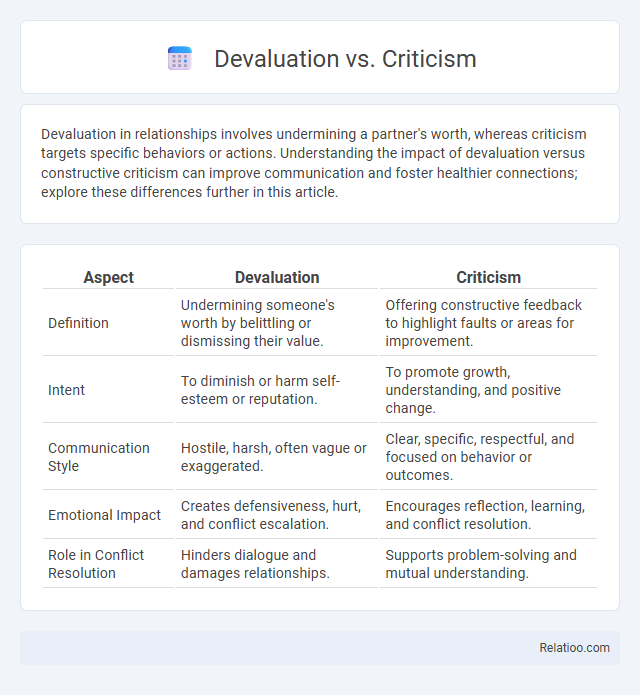Devaluation in relationships involves undermining a partner's worth, whereas criticism targets specific behaviors or actions. Understanding the impact of devaluation versus constructive criticism can improve communication and foster healthier connections; explore these differences further in this article.
Table of Comparison
| Aspect | Devaluation | Criticism |
|---|---|---|
| Definition | Undermining someone's worth by belittling or dismissing their value. | Offering constructive feedback to highlight faults or areas for improvement. |
| Intent | To diminish or harm self-esteem or reputation. | To promote growth, understanding, and positive change. |
| Communication Style | Hostile, harsh, often vague or exaggerated. | Clear, specific, respectful, and focused on behavior or outcomes. |
| Emotional Impact | Creates defensiveness, hurt, and conflict escalation. | Encourages reflection, learning, and conflict resolution. |
| Role in Conflict Resolution | Hinders dialogue and damages relationships. | Supports problem-solving and mutual understanding. |
Understanding Devaluation and Criticism
Understanding devaluation involves recognizing the tendency to dismiss or undervalue someone's qualities or achievements, often linked to emotional defenses in psychological contexts. Criticism, by contrast, refers to evaluating or analyzing actions, behaviors, or ideas, which can be constructive or negative depending on intent and delivery. Differentiating between devaluation and criticism is crucial for effective communication, as devaluation damages relationships by undermining self-worth, whereas criticism aims to improve or provide feedback.
Key Definitions: Devaluation vs Criticism
Devaluation refers to the act of diminishing or undermining the worth, importance, or value of someone or something, often tied to emotional or interpersonal contexts. Criticism involves the objective analysis and evaluation of faults or merits, typically aiming at constructive feedback or improvement. Understanding the distinction is crucial: devaluation is a subjective reduction in perceived value, while criticism is an analytical process intended to assess and potentially improve.
Psychological Impact of Devaluation
Devaluation in psychology refers to the process of attributing exaggerated negative qualities to oneself or others, significantly impacting your self-esteem and emotional well-being. Unlike criticism, which involves constructive feedback aimed at growth, devaluation leads to feelings of worthlessness, diminished confidence, and increased vulnerability to depression and anxiety. Recognizing the psychological impact of devaluation is crucial for developing healthier coping mechanisms and improving emotional resilience.
Constructive Role of Criticism
Criticism plays a crucial role in personal and professional growth by providing specific, actionable feedback that helps you improve skills and performance. Unlike devaluation, which dismisses worth or contributions, constructive criticism targets behaviors or outcomes without attacking personal identity. Understanding this distinction enables you to embrace feedback as a tool for development rather than perceiving it as a negative judgment.
Signs of Devaluation in Communication
Signs of devaluation in communication include consistent dismissal of others' ideas, frequent use of sarcasm or belittling remarks, and persistent undermining of achievements or contributions. Nonverbal cues such as eye-rolling, sighing, or avoiding eye contact often accompany verbal devaluation, signaling lack of respect or interest. Recognizing these patterns helps distinguish devaluation from constructive criticism, which aims to improve rather than demean.
Differentiating Healthy Criticism from Devaluation
Healthy criticism provides constructive feedback aimed at personal growth and improvement, respecting Your dignity and fostering self-awareness. Devaluation, by contrast, involves dismissing or minimizing someone's worth, often leading to emotional harm and lowered self-esteem. Differentiating these requires recognizing the intent and impact: criticism targets behavior or ideas objectively, while devaluation attacks inherent qualities or self-worth.
Effects on Self-Esteem and Motivation
Devaluation undermines your self-esteem by diminishing your sense of worth and can sap motivation through persistent negative internal judgments. Criticism, when constructive, may challenge you to improve while preserving confidence, but harsh or unfocused criticism often leads to decreased motivation and self-doubt. Differentiating between devaluation and criticism is crucial to fostering resilience and maintaining healthy self-esteem in personal and professional growth.
Strategies to Respond to Devaluation
Devaluation involves dismissing or belittling someone's worth, often damaging self-esteem, while criticism focuses on evaluating specific actions or behaviors constructively. Effective strategies to respond to devaluation include setting clear personal boundaries, recognizing and affirming your intrinsic value, and seeking supportive relationships that reinforce positive feedback. Your ability to differentiate between harmful devaluation and constructive criticism empowers you to maintain emotional resilience and promote personal growth.
Encouraging Positive and Constructive Feedback
Encouraging positive and constructive feedback requires distinguishing between criticism, devaluation, and genuine evaluation. Criticism offers specific, actionable insights aimed at improvement, while devaluation dismisses or undermines worth without rationale. Emphasizing respectful communication fosters growth by promoting clarity, motivation, and mutual understanding in feedback exchanges.
Building a Culture of Respectful Criticism
Building a culture of respectful criticism involves distinguishing devaluation from constructive feedback by emphasizing accountability and empathy in communication. Respectful criticism fosters psychological safety, encouraging open dialogue and continuous improvement without undermining individual dignity or self-esteem. Organizations that prioritize clear guidelines and training in delivering balanced critique cultivate trust and enhance team cohesion, driving sustained performance and innovation.

Infographic: Devaluation vs Criticism
 relatioo.com
relatioo.com